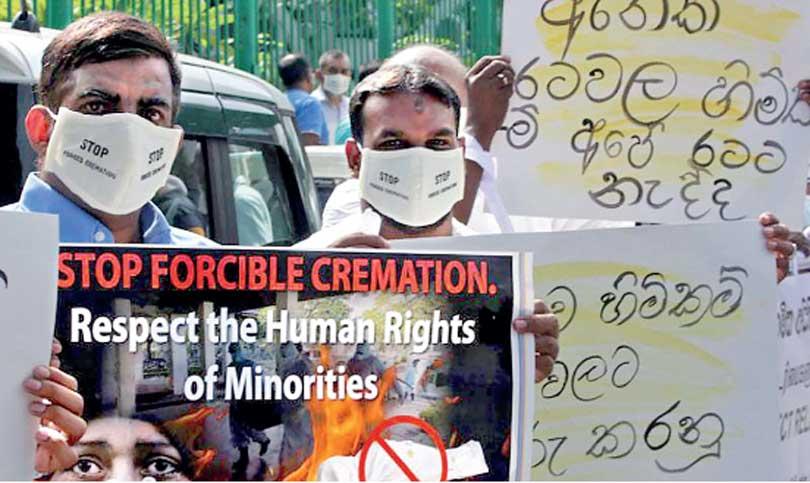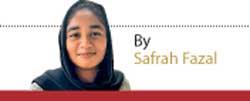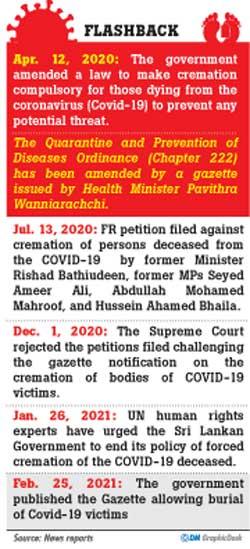25 Apr 2024 - {{hitsCtrl.values.hits}}

A protest against the government’s cremation-only policy in December, 2020
Photo by Pradeep Dilrukshana
 “I was not allowed to see my baby for the last time and that haunts me even today. It’s an inconsolable sadness,” Mohamed Fahim, the father of 20-day-old baby Shaykh, who was forcibly cremated back in December 2020, told Daily Mirror. Fahim and his wife, who were blessed with a baby after six years, are still reeling from the pain of being deprived of giving their baby a religiously-mandated burial.
“I was not allowed to see my baby for the last time and that haunts me even today. It’s an inconsolable sadness,” Mohamed Fahim, the father of 20-day-old baby Shaykh, who was forcibly cremated back in December 2020, told Daily Mirror. Fahim and his wife, who were blessed with a baby after six years, are still reeling from the pain of being deprived of giving their baby a religiously-mandated burial.
“When my father passed away, we didn’t inform our mother. We were worried that she would fall ill. And if anything happened to her, we were afraid that we’d have to cremate her too. When my father was taken to the Udumulla Crematorium, area residents protested, fearing the smoke released during cremation would affect them. When we were taken for quarantine, we were transported in buses escorted by the Police and Army and there were sirens blaring. We were taken like criminals or terrorists. We were under immense stress during that period,” Fayaz Joonus somberly recalled, reflecting on  the events that transpired around the time of his father’s death in April 2020. His 73-year-old father was among the earliest Muslims to be cremated.
the events that transpired around the time of his father’s death in April 2020. His 73-year-old father was among the earliest Muslims to be cremated.
“After my father was cremated, a medical officer appeared in an interview on a popular media channel and claimed that my father had links to drug addicts in Suduwella and Ja-ela. These claims are false. My father was suffering from a kidney-related illness and could barely walk for 2-3 weeks before being admitted for COVID-19. He wasn’t a drug addict; in fact, he was a retired mechanical foreman at the Department of Prisons. We contacted the medical officer directly and asked him how he could make such allegations without knowing the patient. He responded by saying that they had come across this information. The case is still pending with the Human Rights Commission of Sri Lanka (HRCSL),” Joonus added.
The stories of Fahim and Joonus are just two harrowing experiences under Sri Lanka’s ‘cremation-only’ policy for COVID-19 deaths; justified by a claimed risk of groundwater contamination. This policy was imposed despite the World Health Organization (WHO) approving burials for COVID-19-related deaths, emphasising the absence of evidence for groundwater contamination. The policy, criticised against for discriminating against Muslims and certain Christian groups, drew condemnation from international organizations like Amnesty International, Human Rights Watch, the Organization of Islamic Cooperation, and UN bodies. Despite the global outcry, the government persisted in enforcing the cremation policy based on recommendations from an expert committee appointed by the Ministry of Health.
Apart from having to helplessly stand by and watch their loved ones being cremated, the policy caused immense distress to the Muslim community whose members were also accused by some authorities of posing the greatest risk of spreading the virus. This was presumed to be due to many in the community delaying seeking treatment for fear of cremation. Notably, there was also an incident where an individual contacted a popular media channel requesting them to provide a breakdown of the COVID-19 deaths by ethnicity in their daily reports.
What caused the recent apology?
Early this month, Minister of Water Supply and Estate Infrastructure Development Jeevan Thondaman extended an apology to the Muslim community for the pain inflicted on many families by the enforced cremation policy. He alongside Minister Ali Sabry announced plans to submit a Cabinet paper seeking a formal government apology for the harm caused.
Thondaman explained that since assuming office as the subject Minister he had requested officials to conduct an independent study to determine the truth about allegations of groundwater contamination through COVID burials. “The findings of this study have now proven to us that the concerns regarding water contamination were misguided and the decision to forcefully cremate those who succumbed to COVID-19 was not based on any science,” Thondaman stated in a Tweet. Days later, President Ranil Wickremesinghe acknowledged the challenges and “immense distress” that “the pandemic posed” on the Muslim community in conducting last rites.
A press release from the President’s Media Division announced the establishment of a new committee to coordinate arrangements for the last rites of individuals in keeping with their religious customs or the final wishes, including those within the Muslim community.
“Future legislation will enable individuals to carry out their last rites in accordance with their religious beliefs or final wishes, ensuring everyone’s right to burial or cremation. We are committed to formulating the necessary regulations to honour individuals’ preferences in this regard,” the press release added.
The President, however, made no mention of an official apology.
What does the recent research say?
The recent research that inspired Minister Thondaman’s apology is an update to a study conducted in 2021 by the University of Sri Jayewardenepura. The initial study investigated the presence of the SARS-CoV-2 virus in surface and wastewater across various locations in Sri Lanka to assess the risk of viral transmission through water.
When contacted by Daily Mirror, a representative of the Ministry of Water Supply and Estate Infrastructure Development - who spoke on terms of anonymity- clarified that the recent update was a comprehensive review of all literature available on the subject. This review compiled all published data related to COVID-infected burials and groundwater contamination from around the world.
“The COVID virus doesn’t survive for more than two days after the patient who contracted it dies. If proper WHO guidelines are followed with deep burials in sealed body bags, there is no possibility of the virus contaminating water. In a worst case scenario, if by chance the virus does seep into the water, with the addition of 0.5mg per litre of chlorine to drinking water, the virus will not be able to survive at all. However, there is a risk of groundwater contamination through faeces and urine from COVID-19 patients, as the previous study conducted in 2021 found,” the representative explained.
Who should really apologise?
 Daily Mirror reached out to the then State Minister of Pharmaceutical Production, Supply and Regulation, Prof. Channa Jayasumana, to obtain his opinion on the cremation policy and about the discussion of a formal apology from the government.
Daily Mirror reached out to the then State Minister of Pharmaceutical Production, Supply and Regulation, Prof. Channa Jayasumana, to obtain his opinion on the cremation policy and about the discussion of a formal apology from the government.
“From the beginning, I was of the opinion that cremation, disregarding religious beliefs, was not appropriate or acceptable. At the same time, there was no scientific evidence to support the claim that the virus could spread through COVID-infected burials and contaminate groundwater. It’s impossible, and is basic biological knowledge. By definition, viruses are inactive forms and need living tissues for survival. The decision taken by certain people was unscientific. At that time, I expressed my displeasure regarding this particular decision. As far as I know, this decision was taken by a panel of experts who were basically non-medical persons. We were never contacted for our opinions. I was also wrongly accused of being in support of the cremation-only policy. But it was not me who was in favour of it. It was someone else who went by the same first name,” Prof. Jayasumana said.
Reflecting on the meetings of the Presidential Task Force, established to combat COVID-19, Prof. Jayasumana mentioned that a senior official responsible for intelligence services made a statement asserting that the burial of Muslim bodies could cause tensions between ethnic groups. “The particular official said that if Muslims were allowed burials, extremist groups may exhume the bodies and cremate them. But it was obvious that during a pandemic, nobody would take the risk of exhuming bodies,” said Prof. Jayasumana.
However, he also added that the Task Force was never empowered to take a decision on the burial issue.
Prof. Jayasumana added that if anyone should apologise, it should be the expert committee that recommended the cremation of bodies and not the subject Minister of Water Supply. “The government has some responsibility, but the ones who took this decision should be the ones who must apologise.”
Attempts made to contact the then Health Minister, Pavithra Wanniarachchi, to obtain a comment were futile.
Is an apology a step in the right direction?
Helpless against the government’s imposition of the policy as well as the subsequent oppression by certain authorities, aggrieved parties sought the intervention of the HRCSL.
Explaining the position of the Commission, Prof. Deepika Udagama, who served as the Chairperson of HRCSL during this period, informed Daily Mirror that if the Government had provided internationally accepted credible evidence of groundwater contamination through COVID-infected burials, the Commission would have accepted the decision.
“However, in the absence of such evidence, we wanted to understand the rationale behind the authorities’ refusal to permit burials. We were unaware of who the scientific authorities that the government relied on. There was some indication that it was the University of Sri Jayewardenepura that commissioned a report. I cannot recall what the outcome was. If the government had scientific evidence, they should have presented it to the public categorically. My recollection is there was no such evidence,” opined Prof. Udagama.
She added that although the Commission wrote to the Health Ministry requesting reasons for disregarding WHO directives pertaining to burials, they did not receive a response from the Ministry.
Speaking of a likely apology, Prof. Udagama said, “If the apology is sincere and is issued officially by the government, then it is a step in the right direction for a country that is not used to apology or accountability. Of course, the community affected has to decide on whether an apology is sufficient, because it was an extremely painful ordeal. From these painful episodes of our history, we have to learn lessons for our future.”
Would an apology suffice?
Human rights activist Shreen Abdul Saroor shared that many families affected by the cremation policy were still reeling from the distress of being deprived of performing the religiously-mandated last rites for their loved ones.
“On March 27, 2020, a circular from the Ministry of Health allowed for deep burials or cremations within 24 hours. However, when the first Muslim suspected of COVID died in Negombo on March 30, he was cremated within hours without family members being able to view the procedure. Later, the circular was revised, and the option for deep burials was removed. These were calculated moves by the then government and its structures to spread hate against Muslims, and thus, they came up with this racist policy. We went to the Supreme Court, which refused to hear the case; and the HRCSL could not deliver much,” said Saroor.
On December 1, 2020, by a majority decision, the Supreme Court dismissed twelve Fundamental Rights petitions challenging the Sri Lankan government’s cremation policy. These petitions were filed on grounds that it violated the right to freedom of religious belief and faith.
Speaking on whether an apology would be acceptable, Saroor said, “If this government is genuinely interested in delivering justice to victims of forced cremations, they need to get to the root of the racist policy and structures that were behind it and ensure that there is guaranteed non-recurrence. We know that both Minister Thondaman and the President are interested in this topic now because they need Muslim votes, and if that is the case then let them come up with a mechanism that can deliver justice to the aggrieved, not an apology”.
When queried if he would consider forgiving the government if an official apology was issued, Fahim, mentioned earlier in this story, responded by saying, “It is only the people who were affected by this that know of its pain. Why should they ask for forgiveness now? No matter how much they apologise, I am not willing to forgive them.”
Joonus, mentioned at the inception of this story, also expressed similar sentiments about an apology from the government by saying, “I don’t know if a simple apology can reverse the pain, difficulties and stress we underwent. Minister Thondaman wasn’t involved in any of this. Why is he apologising for others’ mistakes? Justice should be served to those who were victimised at the time.”
04 May 2024 47 minute ago
04 May 2024 2 hours ago
04 May 2024 2 hours ago
04 May 2024 2 hours ago
04 May 2024 3 hours ago